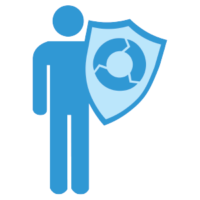As COVID-19 sweeps the globe, causing unprecedented effects, nonprofits, foundations, and governments are working to figure out the best course of action to serve their communities. Incorporating feedback from affected communities, alongside expert advice, is absolutely vital in determining a COVID-19 response.
Yet, questions about how to best listen and act on feedback in this new reality – where social distancing is the norm and the needs are ever-growing – remain.This guide is intended to help organizations working directly with communities affected by COVID-19 best navigate these challenges to truly understand the needs of constituents and how to best serve those needs.
To explore how feedback loops are implemented for successful philanthropic and nonprofit programming, and illustrate their necessity in responding to COVID-19, please join us for an upcoming webinar.
Making the case
In a pandemic, does collecting and responding to feedback still matter? We have identified five key benefits to investing in feedback at this time, along with further reading to support and encourage you as you craft your listening practices during this pandemic:
1. Incorporating feedback from affected communities into your COVID-19 response can help you identify the most effective solutions to address the needs of those you serve.
What Might Africa Teach the World? Covid-19 and Ebola Virus Disease Compared
What Might Africa Teach the World? Covid-19 and Ebola Virus Disease Compared
“This example of responders modifying their approach to infection control better to accommodate family requirements may hold lessons for Covid-19.”
Human Rights and Coronavirus: What’s at Stake for Truth, Trust, and Democracy?
Human Rights and Coronavirus: What’s at Stake for Truth, Trust, and Democracy?
“It is not enough for any government to merely assert they are doing what is necessary or effective. The essence of human rights—and democracy—is that the authority of government resides in the people. We are not passive targets either of an oncoming virus, or of governmental programs.”
Why listening to beneficiaries is more than a moral obligation
Why listening to beneficiaries is more than a moral obligation
“If you talk to beneficiaries you’ll begin to understand more about the complexities of their needs. They’ll know first-hand what the issues are, what needs to change, what does and doesn’t work and the real barriers to delivery. They may bring an insight that can only come from personal experience – however good your own team.”
2. Prioritizing listening and acting on feedback from affected communities in your COVID-19 programming can save valuable time and money.
Core Humanitarian Standard
“Time spent consulting early can save a lot more time trying to fix inappropriate decisions later on.”
How to Help in a Pandemic: Ask Before You Donate 1,000 Pizzas
How to Help in a Pandemic: Ask Before You Donate 1,000 Pizzas
“What [John Merz] would advise anyone looking to do something right now is to ask the people who require help what they want, ‘rather than just barreling through with your need to help.’ “
3. Listening to affected communities is a humanitarian best practice in crises.
Core Humanitarian Standard on Quality and Accountability
Core Humanitarian Standard on Quality and Accountability
Criterion 4: “Humanitarian response [should be] based on communication, participation and feedback.”
The Sphere Handbook
“Encourage and facilitate communities and people affected by crisis to provide feedback on their level of satisfaction with the quality and effectiveness of the assistance received, paying particular attention to the gender, age and diversity of those giving feedback.
-
- Train staff to gain and maintain people’s trust, know how to respond to both positive and negative feedback and observe the reactions of different community members to the way services are provided.
- Integrate feedback collection into a broader approach across organisations or sectors to review, analyse and act on the feedback.
- Share response to the feedback with the community.’
4. Funders are committed to listening and acting on feedback during the COVID-19 crisis.
A Call to Action: Philanthropy’s Commitment During COVID-19
A Call to Action: Philanthropy’s Commitment During COVID-19
More than 700 funders have pleaded to “Commit to listening to our partners and especially to those communities least heard, lifting up their voices and experiences to inform public discourse and our own decision-making so we can act on their feedback. We recognize that the best solutions to the manifold crises caused by COVID-19 are not found within foundations.”
Fulfilling Philanthropy’s COVID-19 Pledge: Listening in a Time of Crisis
Fulfilling Philanthropy’s COVID-19 Pledge: Listening in a Time of Crisis by Valerie Threlfall, Melinda Tuan, and Fay Twersky states: “We believe listening to all voices — especially voices least heard — is essential, particularly as funders seek to inform effective responses to the many requests coming their way.”
5. Listening helps you identify whose needs aren’t being met and emphasizes diversity, equity, and inclusion.
A New Covid-19 Crisis: Domestic Abuse Rises Worldwide
Example from the Brooklyn Community Foundation
We see another example in the CEP piece: “In response to COVID-19, the Brooklyn Community Foundation immediately held calls with local groups serving elders, immigrants, and domestic workers to get a pulse on how they would be most impacted by the health crisis and to learn about how the foundation could help.”
Quick Tips

1. Build trust to hear unbiased feedback
During social distancing, when you may not be able to meet with affected people in person, it may feel hard to build or maintain relationships with the communities you serve. However, effective feedback loops still require trust. If you’re working with communities with which you’ve established a relationship, build on that relationship. If you need to build trust, plan for how to build that trust from the beginning. Remember that engaging in two-way conversation, even from a distance, will build more trust than simply extracting feedback. Let affected people know upfront why you are collecting feedback, how they can communicate with you, and when they can expect a response or follow-up.

2. Listen in a way that doesn’t burden people during a stressful time.
During COVID-19, people have even more concerns on their minds than usual, and responding to a request for feedback immediately may not feel possible. Try and give people time, space, and multiple options to answer in the way that makes the most sense for them. Be flexible on deadlines or how you hear from people. Where possible, ask people how they prefer to be communicated with.

3. Consider changing your methodology and delivery method to match current community needs.
The COVID-19 crisis has fundamentally shifted how all of us communicate. Whereas you may have previously sought feedback through one-on-one conversations or in-person focus groups, you may have to change your methods to comply with social distancing or other travel restrictions. If you have to change your methods, make sure you consult your constituents on the best way to reach them. Make an effort to ensure that your response is appropriate. Not everyone has a cell phone or internet access. Look into tools like communicating over radio or gathering feedback in a suggestion box if need be, and select the method that is most appropriate for the community that you’re working in. Examine your capabilities, the needs of your community, and look for ways to adapt where needed.

4. Focus on listening to the most marginalized people within the communities you serve.
This pandemic highlights our interconnectedness and the need to ensure that all communities’ health needs are addressed. This crisis may reveal or exacerbate gaps that your organization wasn’t previously addressing. Intentionally seek out those who are harder to reach and who may not have access to the services that better-connected communities are already accessing, and be intentional about listening and acting on feedback you hear from these groups to ensure your response is holistically addressing the needs of those you seek to serve.

5. Be clear about what you can offer and adapt questions to focus on the immediate needs of affected people.
The current needs stemming from this crisis are great: from supplying hospitals with much-needed equipment to addressing the economic fallout to working to close education gaps, your organization may not be able to do everything. When seeking feedback, be clear about what you can do and seek feedback that you can reasonably act on within a clear timeline. Instead of asking “What do you need?” tailor questions to reflect what you are bringing to the table at the time. For example, “If we can provide only one shelf-stable food to you initially, what item would you prefer?” Think through social distancing guidelines, current funding, and other applicable restrictions or opportunities and use those to formulate your questions.

6. Communicate and listen in the native languages of those you’re serving.
You may have new ways or methods of working during this pandemic, which makes it even more important that you’re reaching all affected people in ways that make it easiest for them to provide you feedback. In these times, it’s essential that the questions you ask are clear and the answers you receive are communicated correctly. Asking for feedback in the native languages of those you seek to serve both ensures that your questions are precise and helps to build trust in the communities where you work.

7. Close the loop by telling people how you are responding to their feedback.
During this time of extreme uncertainty, it’s especially important to be as clear as possible with those you serve about what you heard and how you will act on that feedback. Whether you are able to immediately address the needs expressed or not, communicating about what you can do and why, builds trust and lets constituents know you value their time and input. In a time of crisis, when people have more on their plate than normal, acknowledging the time they gave you by following up with your concrete actions is necessary.
Tools
Socialsuite COVID-19 Assessment
Type of tool: Email survey
Fee model: Free during COVID-19
Accessibility: Global; people must have access to email
Summary: Socialsuite’s COVID-19 assessment allows organizations to create an account and then send survey links to their constituents who will receive an initial survey with weekly follow ups. The collected data will be aggregated into easy-to-understand charts and graphs that will help your organization monitor and measure its impact over time.
Remote Survey Tool Kit
Type of tool: Guide
Fee model: Free
Accessibility: Intended for organizations. Page 6 guides you through choosing the most appropriate tools. Page 8 provides a list of remote survey tools.
Summary: This comprehensive guide provides a wealth of information and tools for organizations looking to begin or improve upon their remote survey process. Within it, you will find tips, help choosing the right tool(s), help creating appropriate survey questions, and more.
Ushahidi
Type of tool: Web app, with option to also collect data through email, SMS, and Twitter
Fee model: Self-service plan is free during COVID-19; other pricing plans are variable
Accessibility: Global; people must be able to access internet or mobile phone service
Summary: Ushahidi recommends that your organization contact them in order to walk you through how to get started with their platform and tool options to ensure that your use of their tools is matched to the needs of your organization and community
Viamo
Type of tool: Phone based; SMS and IVR (Interactive Voice Response) – accessible to those with flip-phones and low/no literacy
Fee model: Variable
Accessibility: Audience: Low/no literacy, high language diversity, “flip-phone” or smart-phone, no internet required
Geography: Most services, including mobile phone surveys, are global. Free-to-access 3-2-1 hotline available in 17 countries in Africa and Asia.
Summary: Viamo leverages the fact that almost every household in LMICs has a simple mobile phone. Viamo’s COVID-19 response includes mobile phone surveys, behaviour change communication, remote-worker training, self-triage hotlines, and more. Our services all integrate real-time, live feedback on an online dashboard.
COVID-19 Community Monitor
Type of tool: Two-way communication platform
Fee model: Variable; COVID-19 Community Monitor is offered at a discounted rate
Accessibility: Global; internet access required
Summary: Upinion’s technology works on top of popular social media platforms like WhatsApp and Facebook Messenger. You can send your constituents short, weekly survey tailored to their community and current interventions, and results come through in real-time so your organization can closely monitor their needs. Upinion also ensures that all two-way communication is private, secure, and GDPR compliant.
Feedback Commons
Type of tool: A full-service feedback management system that includes survey tools, analysis, benchmarking against other related work, and in-person support.
Fee model: Variable
Accessibility: Global; dependent upon chosen service(s)
Summary: Feedback Commons is a comprehensive tool for those who are ready to invest in a long-term feedback management system. You will work closely with the Feedback Commons team to build a system of collecting and interpreting data that works best with the needs of your organization and constituents, and you’ll have their continued support throughout the duration of your partnership.
